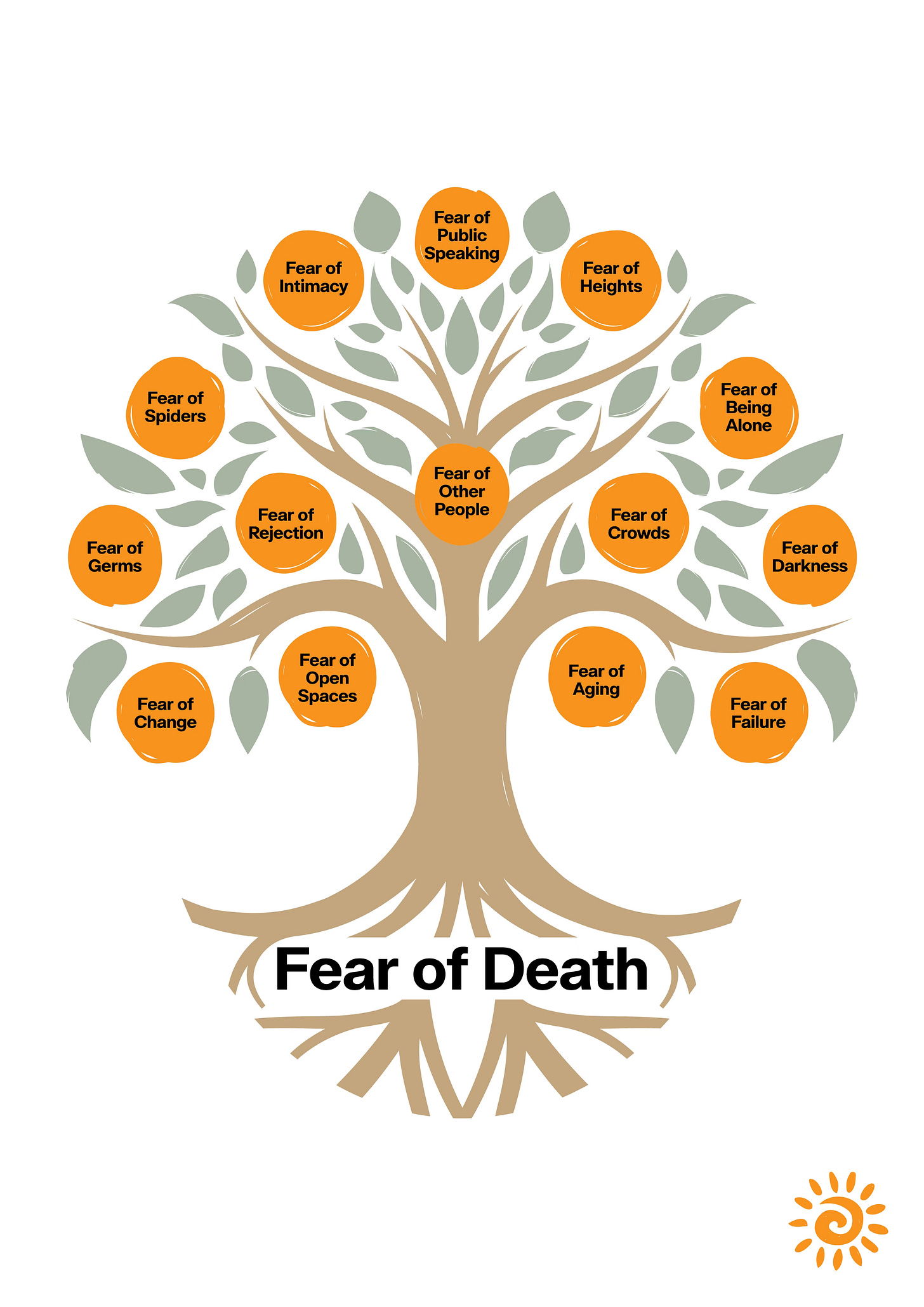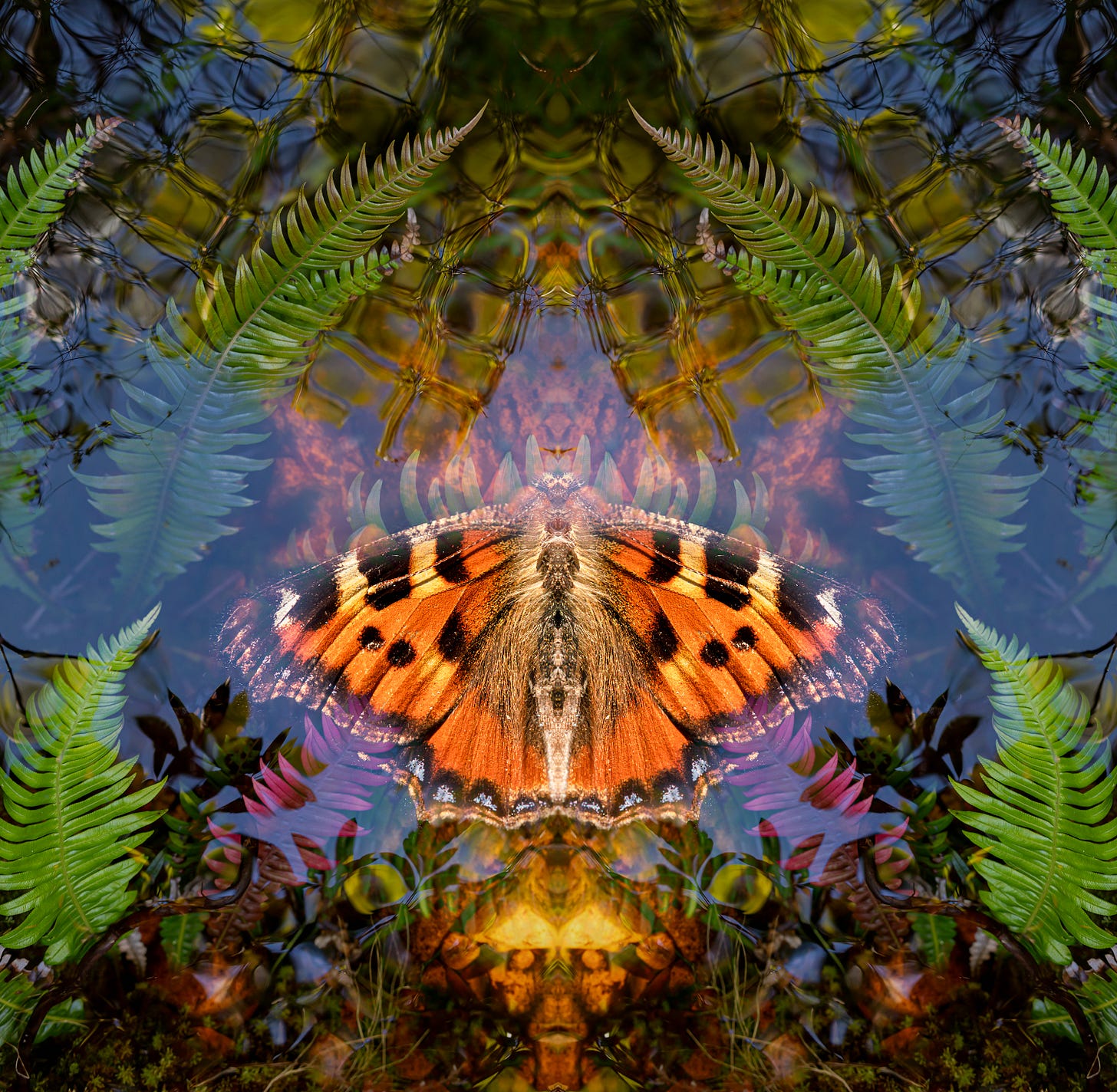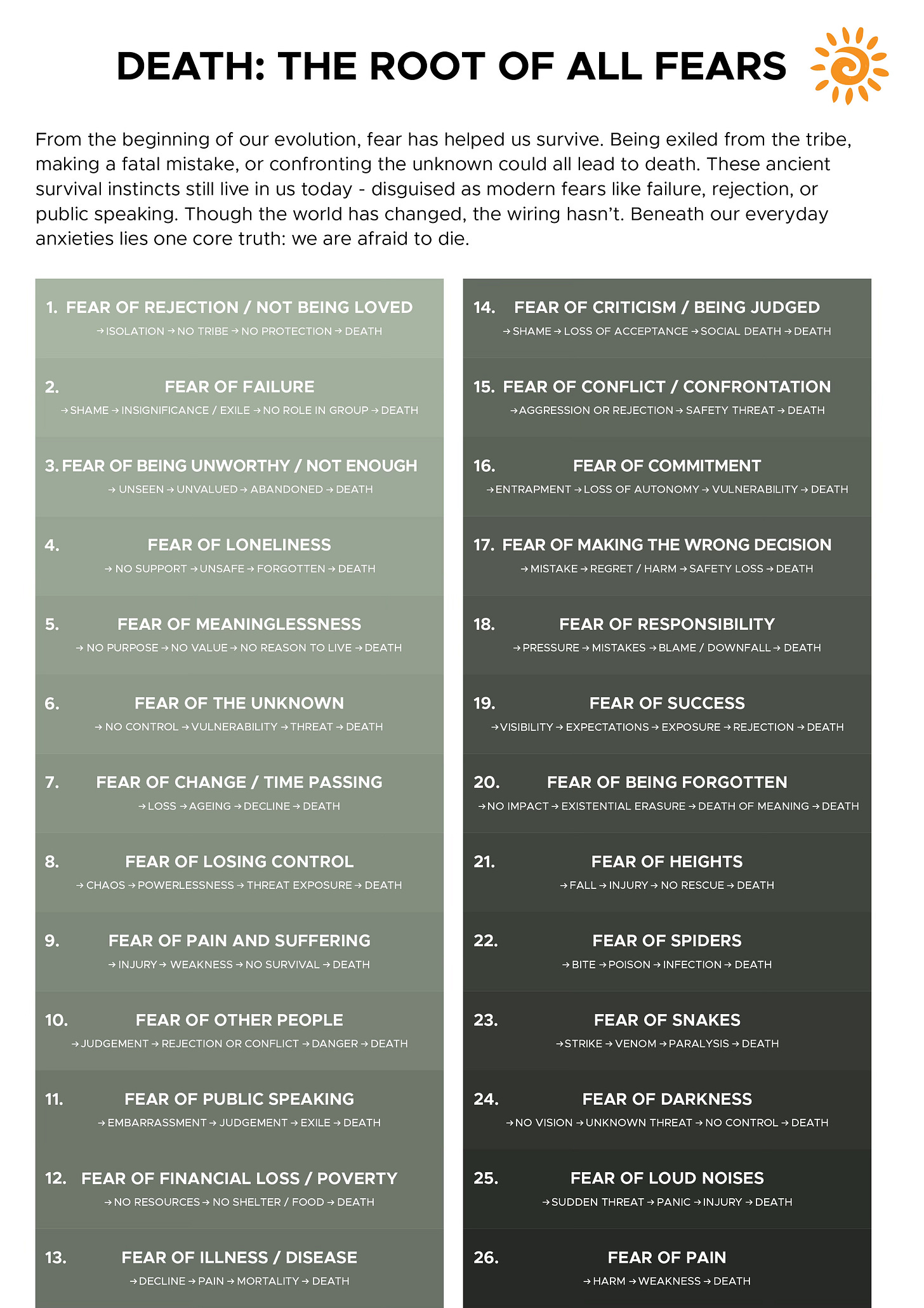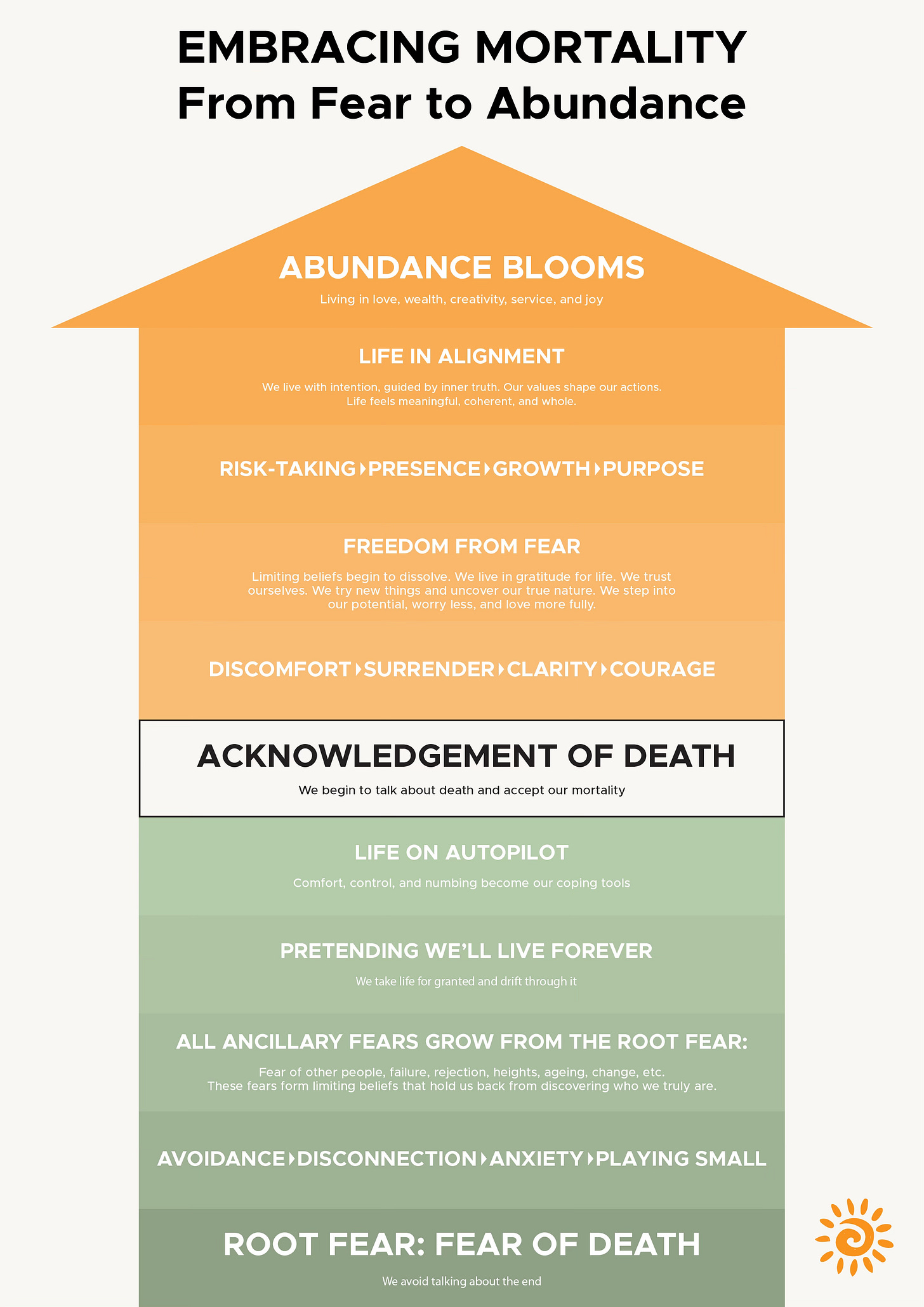The Fear of Death – And What It’s Really Telling Us
The Hidden Force Controlling Your Life (And How to Break Free) - The Key to Your Highest Potential?
Fear is ancient, it once kept us alive. But today, most of what we call danger is just the mind trying to protect us from change.
What if, instead of running from death, we faced it, and in doing so, discovered how to truly live?
That quiet, persistent dread of death. Most of us don’t talk about it. We weren’t educated how to deal with it. We rarely even admit it to ourselves. But whether we’re aware of it or not, that fear is always there, humming in the background, quietly steering the ship.
It shows up in ways we don’t expect. In the tension before a big presentation. In the anxiety about being seen. In the overwhelm of trying to get everything done. In the pressure to prove ourselves, to fit in, to not fall behind.
Modern research increasingly suggest that most fears are branches of one root: our fear of death.
The Root of All Fear
Imagine fear as a sprawling, ancient tree, its roots reaching deep into the core of our existence. At its heart lies the fear of death, the ‘Grandmother’ of all fears. The original fear as old as humanity itself, from which every other twig, branch, and leaf of fear grows.
Think of all the common fears people have: fear of public speaking, unfamiliar cultures, heights, flying, spiders, snakes, enclosed spaces, darkness, intimacy, and love, to name just a few. Every ancillary fear we experience is merely a branch growing from a single root. The fear that has driven our survival instinct since the dawn of time.

Psychologists have studied this dynamic for decades under what’s called Terror Management Theory (Greenberg, Solomon & Pyszczynski, 1986). TMT (tested in well over 500 studies worldwide) shows that even subtle reminders of mortality make people more defensive of their beliefs, more punitive toward “outsiders,” and more driven to grab status or stuff, classic fear responses wearing different masks.
Clinical psychology finds the same taproot: a 2014 review in Clinical Psychology Review by Iverach, Menzies & Menzies concluded that death anxiety is a “transdiagnostic construct” underlying a wide range of disorders—panic, health anxiety, OCD, social fears, even depression.
Often, the big fear gets displaced onto “safer” targets like germs or spiders. Experiments confirm this: mortality reminders reliably intensify those specific symptoms—stronger spider phobia, heavier compulsive washing of hands, just what you’d expect if the smaller fears grow from the larger one.
From the beginning of our evolution, fear has helped humanity survive. Being exiled from the tribe, making a fatal mistake, disease, or confronting the unknown could all lead to death. These ancient survival instincts still live in us today, disguised as modern fears like failure, rejection or public speaking.
Even the fear of love can be traced back to death, the terror of deep connection lies in the risk of profound loss, reminding us that everything we cherish is, ultimately, impermanent.
The world has changed, but our wiring hasn't. Beneath our everyday anxieties lies one core truth: we do not want to die.
And now that ancient survival instinct, unrecognised, might be the very thing that is holding humanity back from evolving, and causing untold destruction.
We spend vast portions of our lives, and billions of dollars, trying to patch over these ancillary fears. We go to therapy, consume endless self-help content, practice avoidance. But rarely do we pause to name or face the root fear itself.
Consider, for a moment, how few people are even aware of this underlying fear, the silent force shaping so many of our important decisions.
That’s largely because we’ve been conditioned not to talk about death in the West.
It’s seen as morbid, uncomfortable, even taboo. But in avoiding it, we grant it more power, allowing it to manifest in subtler, more insidious ways that quietly shape our lives.
Neuroscience backs this up. Research shows that when people are reminded of death, the brain almost instantly pushes those thoughts out of conscious awareness. For example, a 2012 study by Klackl and colleagues in Social Cognitive and Affective Neuroscience found that mortality reminders triggered suppression processes in the brain, diverting attention away from death-related thoughts and storing them in the unconscious.
Similarly, Trafimow and Hughes (2012) tested thousands of participants across 11 countries and confirmed that death thoughts initially decrease right after being activated—only to re-emerge later once conscious defences relax.
More recently, a 2024 systematic review of neuroimaging studies found that mortality cues consistently engage the amygdala and anterior cingulate cortex—areas of the brain linked to fear, conflict, and self-regulation—showing that death anxiety has a distinct neural footprint.
In other words, we are neurologically programmed to avoid dwelling on mortality—precisely why it influences us so powerfully from the shadows.
In truth, the fear of death appears to be the foundational fear in human consciousness. It lives deep in the oldest part of the brain, the medulla, the region responsible for keeping us breathing, for keeping us alive. From there, it powers every survival instinct we have.
What Happens When We Ignore It?
The problem isn’t just that we fear death—it’s that we refuse to engage with that fear. We are not at peace with it. Instead, we let it control us. It keeps us from taking risks, from fully embracing change, from loving with our whole hearts. It makes us cautious, afraid of others, hesitant, stuck in cycles of indecision.
The fear of death creates limiting beliefs that causes immense collective suffering.
By not acknowledging death, we allow it to seep into our daily lives in disguised forms—perfectionism, overachievement, avoidance. These small fears confine us, keeping us from discovering our true selves and living fully. What if, instead of pushing them away, we turned toward them? What if, by addressing the grandmother fear, we freed ourselves from all the smaller ancillary fears?
“The world is full of people suffering from the effects of their own unlived life. They become bitter, critical, or rigid, not because the world is cruel to them, but because they have betrayed their own inner possibilities. The artist who never makes art becomes cynical about those who do. The lover who never risks loving mocks romance. The thinker who never commits to a philosophy sneers at belief itself. And yet, all of them suffer, because deep down they know: the life they mock is the life they were meant to live.” (Unknown source)
The Fear That Fuels Our Lives
Avoiding death doesn’t just shape our fears—it shapes how we live. Think of how often people chase success, accumulate wealth, or seek recognition, not because they deeply desire those things, but because they offer a false sense of permanence. We crave material legacy, a way to outlast our mortal limits.
This primal fear also fuels social belonging, security, and sexuality. Once essential for survival, these instincts still drive much of our behaviour today. The need to belong pushes us to seek approval and overwork—ambition often becomes an unconscious strategy to prove our worth.
The security instinct can lead us to build safety nets, but when overextended, it drives hoarding, compulsive consumption, or comfort-seeking habits that ironically harm us.
On a global scale, ignoring the fear of death quietly shapes cultures by fuelling consumerism, disconnection from nature, and an obsession with control—driving societies to prioritise individual survival over collective wellbeing.
When we avoid mortality, we unconsciously design systems, economic, political, and ecological, that exploit, distract, and divide, rather than honouring the cycles of life and fostering long-term stewardship.
The Terror Management Theory research shows that when people are reminded, even subtly, of their own mortality, they become more defensive of their worldviews, more materialistic, and more prone to aggression toward outsiders. It’s one reason fear of death doesn’t just shape personal choices, it ripples out into culture and politics.
When we’re disconnected from the truth of our shared mortality, we project our fears onto people who look, think, or live differently than we do.
At its root, racism, xenophobia, and tribalism are all primal fear-based defences against the unknown—attempts to control or eliminate what feels like a threat to our identity, safety, or survival.
Multiply that fear across nations and cultures, and it manifests as conflict, oppression, and war.
Fear of death doesn’t just lead us to consume the planet, it leads us to fear each other. And from that fear, we justify division, violence, and the continued destruction of the Earth.
Ultimately, our unexamined fear of death underpins both ecological collapse and human conflict. Until we face it, we will keep trying to conquer life instead of learning to live in right relationship with it.
We’re basically trying to outsmart the Grim Reaper, like when toddlers play hide and seek by covering their eyes and assuming they’re invisible.
But no amount of success can prevent the inevitable. When we acknowledge this, we start making choices based on meaning rather than avoidance. We prioritise depth over distraction, experience over status, and love over fear.
Turning Fear Into Freedom
Here’s the paradox: the simple act of acknowledging the fear of death doesn’t make life darker, it makes it brighter.
It’s time to stop taking life for granted and start talking about death.
When we accept that time is finite, we stop wasting it. We start saying yes to the things that truly matter, and no to the things that don’t. We take more risks. We love more fiercely. We stop living cautiously and start living courageously.
Research also suggests that awareness of death doesn’t just increase fear—it can actually increase meaning. Studies inspired by Ernest Becker’s The Denial of Death (1973) show that when people are gently reminded of mortality, they often report greater gratitude, stronger values, and a clearer sense of purpose. In other words, the very thing we fear most can also deepen our capacity to live.
Ancient philosophies have long embraced this concept. The Stoics practised memento mori, a daily reminder of mortality to inspire urgent living.
This quote by Carl Jung’s has become the most important piece of wisdom in my life:
“Where your fear is, there is your task”.
Jung reframes fear not as a barrier, but as a compass. Fear often points to the very thing we need to confront to grow—whether it’s vulnerability, change, or the unknown.
Instead of avoiding discomfort, I’ve learned to see it as an invitation to lean in. Facing fear has unlocked clarity, courage, and a deeper sense of purpose. Growth isn’t found in comfort, it’s hidden in the places we’re most afraid to explore.
But beyond freedom, the simple act of embracing mortality also leads to clarity, purpose, and a deeper sense of fulfilment—relationships, creativity, service, and growth. It also fuels resilience, helping us navigate challenges with a sense of meaning rather than fear, it’s about unlocking the richest, most intentional version of life.
Use your Fear as Fuel. Fear isn’t the enemy. It’s a signpost. Let’s stop running from it and start using it. The time we fear losing is already passing—so let’s make it count.
Please share your thoughts in the comments, I’d love to hear your perspective. And if this letter resonated, share it with someone who might need it.
Live Happy,
Hoppy
Want to go deeper? Read these Newsletters:
The Ripple Effect Of Denying Death





So glad I was guided to find your writings John this resonates deeply with me and craving more deeper conversations around death. At 54 looking at my young adult daughters, elderly mother and my aging process contemplating death has very much become a frequent visitor in my thoughts. On one hand I am fearful in the other it has opened me up to gratitude for the present moment and living an awakened life.
Thank you for this reflective sanctuary 🙏🏽
Love it !! Keep writing